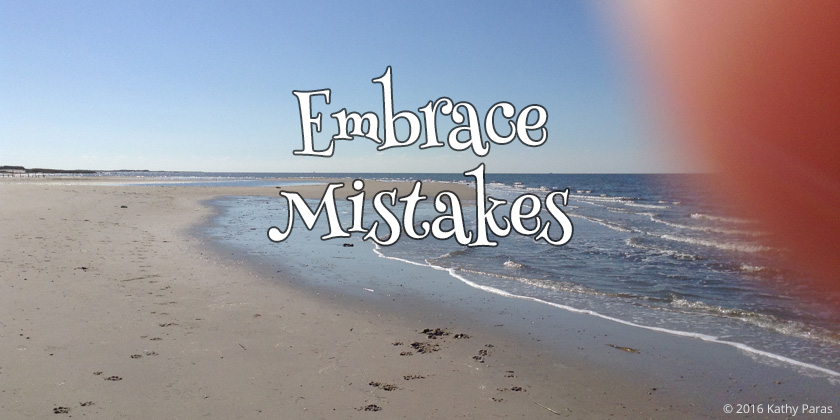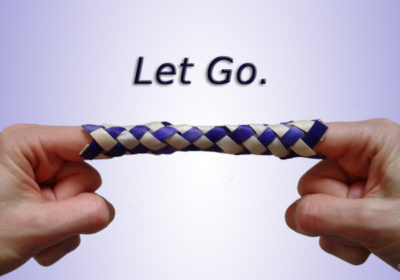Do you find yourself paralyzed or avoiding things because you’re not confident you’ll do it right?
Are you waiting until the time feels right, or until you are ready to take on a certain task or participate in an activity?
Do you berate yourself when you make simple mistakes, or flood with shame when others see you do something wrong or see you stuck without the right answer?
If negative feelings like this are familiar to you, consider these three reasons why developing a healthier attitude toward mistakes can transform your life.
1. Mistakes are normal and necessary for learning and growth.
In life, there is always more to learn.
Contrary to popular belief, we don’t emerge from childhood fully baked, complete with all we need to live the next sixty or seventy years. Life is a continuous cycle of growth and discovery, learning and adapting. No matter how much or how little we arrive on the threshold of adulthood with, there will always be more to learn. And we each arrive with varying amounts of skill, knowledge and experience.
We learn best by trying, failing, adjusting and trying again. Hands-on trial and error promotes creative thinking, develops awareness of actions and their consequences, and adds to a sense of effectiveness and control over ourselves and our environment. We see the results and are present in the physical world.
Mistakes don’t mean that we are inferior or incompetent. Mistakes mean we are human. Mistakes mean there is more to learn.
Opportunities and demands for learning come at us in all areas of life. Not just new skills, like how to manage our finances for retirement. Not just maintaining our physical health as we age. But continually becoming more emotionally strong and mature, expanding our awareness and deepening our understanding of ourselves, others, and the nature of life.
If we don’t push ourselves to adapt and grow, we’ll quickly become lost, obsolete, dependent on those who are willing to put in the effort.
Although it may seem easier, dependence is not a healthy or satisfying way to live.
2. Intolerance of mistakes in yourself makes you judgmental and impatient.
You can’t authentically and consistently treat other people better than you treat yourself.
If you can’t accept your own mistakes, not only will your self-talk be slanted toward the over-critical, you will have less patience with others. You may feel resentful when they can’t do things you have learned how to do, when they don’t put in the effort you do to learn on your own. Their lack of skill or knowledge may feel like a burden or even a threat.
But holding others to your standards, expecting them to be the same as you, not seeing or accepting people as they are, or rejecting them for not being what you want or need leads to an angry, intolerant, stagnant existence, isolating you and alienating others. It can turn you into someone people are uncomfortable around, someone people avoid. If you end up here, you’ll miss out on all the benefits of healthy relationships, friendships and being part of a supportive community.
Acceptance of mistakes, together with attention to the experience, a willingness to understand reality and each individual’s circumstances gives us opportunity for growth, and for connecting with others on a more honest, personal level.
3. By hiding or avoiding mistakes, you project a false version of yourself.
Being visible, in your successes and your failures, makes you more authentic and approachable.
Hiding your mistakes sets a standard in others’ minds that you will feel pressured to live up to and, eventually, struggle to live up to.
This is a very lonely place to be. It feels like being invisible. No one knows who I am. No one truly sees ME. The longer you persist this illusion, for yourself and for others, the higher the stakes of failure become, the more precarious your position. Like climbing a tree, higher and higher, out onto the most fragile limb. You’ve built something that cannot stand the pressures of an entire lifetime. You may become withdrawn, trading health and interaction for self-protection, satisfying one need at the expense of others.
You can live like this for a while. Some manage to do it their whole lives. But if you happen to find yourself in a crisis that pushes you beyond what that persona can handle, you’ll reach a breaking point. Do you let go of that image and become a person who can grow and change to handle the situation, or do you cling to your false identity and go down in flames?
Why do you avoid mistakes?
If you are a person who has learned to get by while avoiding or hiding mistakes, it has probably become a way of life you don’t think much about. And changing that is hard. Something drove you to adopt that behavior. Something that feels as naturally motivating as any basic survival instinct.
Letting go of something that has ensured our survival feels like a huge risk. Fear can push us to lock ourselves into a way of living that we feel we’ve mastered, where nothing is changing. But if we cling to that forever, the world will continue to change around us and challenge us in new ways, and we won’t understand why we’ve become so incapable of handling it.
As children we learn how to do what produces the least discomfort and ensures our survival. One who grew up being constantly corrected, shamed or rejected when making mistakes, or only receiving attention when doing things perfectly, would certainly have been motivated to avoid mistakes and hide imperfections.
Even if we are no longer in relationships with people who are critical and intolerant of imperfection, we may have subconsciously taken over their role. We learn to treat ourselves the way we were treated. Over time, this can even grow to a sense that encountering anything difficult or challenging means we’re not good enough. What’s wrong with me? Why can’t I get this right? Why don’t I already know how to do this? This dredges up the same feelings of shame and rejection that we experienced earlier in life. But those were the reactions of a child, with little understanding of life and little control over his survival.
To move beyond that ingrained behavior, try to pay attention to what emotions surface when you make a mistake. Anger? Shame? Do you feel like a burden? Stupid! Idiot! If you would just pay attention, you wouldn’t keep creating these messes I have to clean up! Mimicking the knee-jerk frustration of an overwhelmed parent? Or like you’ll miss out on something you need—approval, acceptance—if you can’t get it perfect? Or have you built a persona as the fixer, the one who always has the right answer? Would people still like and accept you if you showed up one day with the wrong answer, or no answer at all?
Try to separate those reflexive emotions from today’s reality. You are an independent adult, capable of seeing to your own survival. Capable of learning what you don’t yet know. And you don’t need to avoid disappointing someone in order to get what you need. And while it may take a bit of adjustment, people who are worth being with will accept you, imperfections and all. As for those who continue to shame and criticize you, you will build up inner strength that will allow you to move forward with the mantra “It’s them, not me.”
Your own acceptance of your mistakes is the most powerful weapon in confronting your discomfort.
Before you can learn to show your mistakes to others, you must learn how to accept them in yourself. If you believe that it is okay to make a mistake AND that it’s okay for others to see the real you, it will be easier to push through the discomfort. If you are with the right people, they will not reject you.
Balance and Progress
Being okay with mistakes does not mean abandoning efforts to improve. It means being okay with where you are right now. Being okay with your learning process. Allowing yourself to try things and let other people see your imperfections as you grow.
It also means failing responsibly. Using good judgment and learning from your mistakes. A responsible person doesn’t just blindly keep doing the same thing. Pay attention to your actions, especially how they impact others. If you’ve hurt someone, apologize. Do what is necessary to make amends. Commit to doing better next time. And put effort into learning what you need to improve.
It’s okay, even helpful, to look to others for examples of appropriate, mature behavior. But be careful not to compare yourself to others in terms of worth. No one is inferior. We are all simply at a different place in our journey. You may want to be where they are. You may feel embarrassed, feel the burden of a big challenge ahead. That’s okay. They have challenges, too.
Understanding and accepting that mistakes are normal reduces the sense of risk in making them, especially in public. When the risk is lower, it’s easier to push through the discomfort and forge ahead. The result is less fear and a greater sense of an effective self.
The next time you feel blocked, ask yourself what is at risk. Then dig a little deeper. Is that really true? Is it a reflexive fear leftover from an earlier you? Is it based in the reality of a responsible, healthy life, or an unreasonable expectation by you or someone around you? Or is it something you do need to learn?
The resistance will not go away over night. But each time you put yourself in a situation that generates it, then acknowledge it, understand it, and make yourself move forward, you are teaching yourself that it’s okay. And the resistance and discomfort will begin to fade.
Do you start each day with a goal of perfection in all you do, or to fully experience all that life has to offer?
Are you clinging to where you are right now in your development, or are you open to new experiences and opportunities to learn and grow?
What are some simple, low-risk areas you could experiment with to begin living in a more realistic and self-accepting way?
- Try something in public that you don’t already know how to do or aren’t very good at?
- Speak up in a class or group discussion with a guess and accept others’ input?
- Move forward with a task before you have all the answers, trusting that you have the capacity to figure it out as you go?
- Instead of berating yourself like a frustrated parent the next time you knock over a glass of water, try to understand why you were distracted, forgive yourself, clean up the mess without blowing the impact out of proportion, and work toward paying closer attention to your surroundings?
To feel better than you do today, you must grow into a person who can approach life differently. There can be no growth without change and there can be no change without action. You must put yourself out there, take a risk and try something new, if you want to improve your experience of life.




